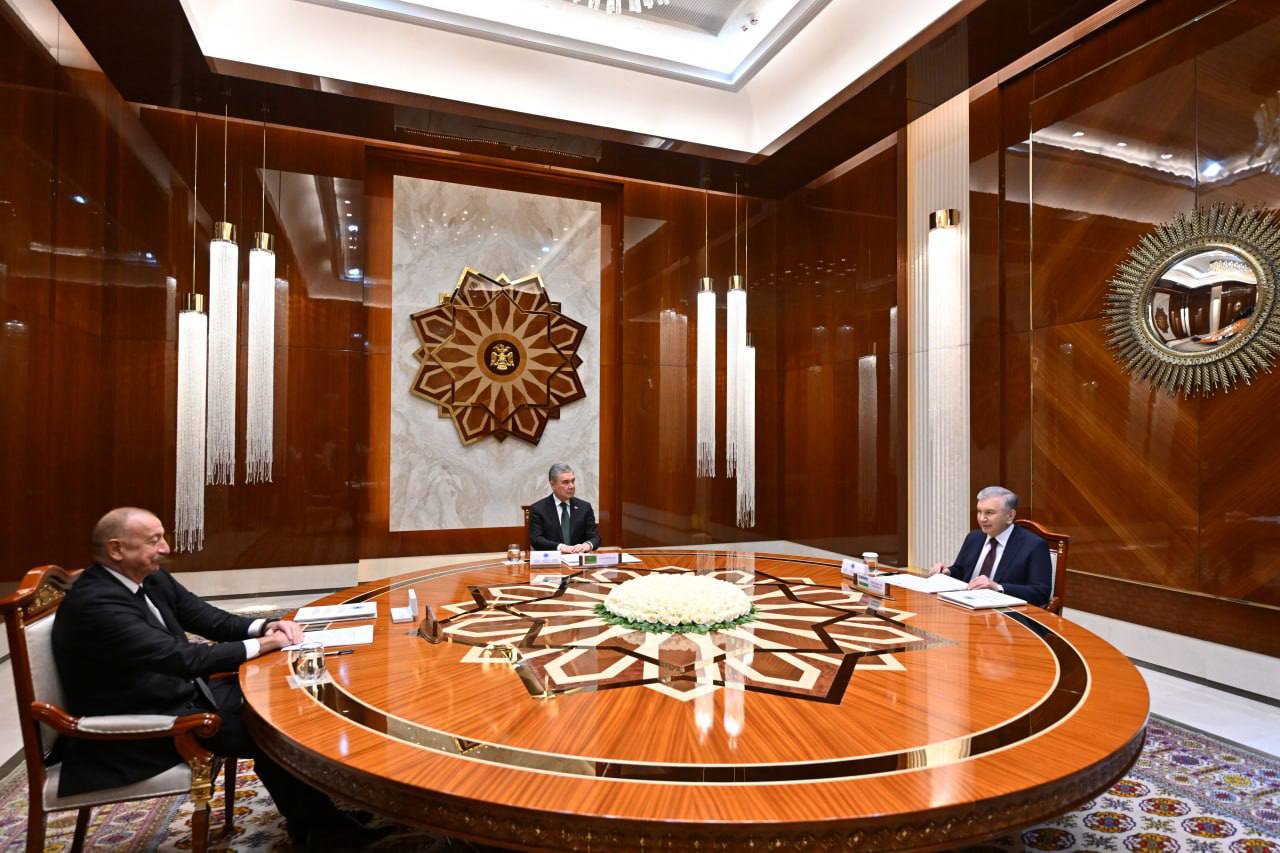A trilateral meeting took place in the “Avaza” National Tourist Zone between the President of the Republic of Uzbekistan, Shavkat Mirziyoyev, the National Leader of the Turkmen people, Chairman of the Halk Maslahaty, Gurbanguly Berdimuhamedov, and the President of the Republic of Azerbaijan, Ilham Aliyev. The press service of the head of our state reports.
Issues concerning the development of multilateral cooperation in trade, economics, transport, communications, energy, and humanitarian spheres were examined.
At the beginning of his speech, the head of our state once again warmly congratulated Gurbanguly Berdimuhamedov on the successful holding of the Third UN Conference on Landlocked Developing Countries at the beginning of August.
The President of Uzbekistan also sincerely congratulated the leader of Azerbaijan, Ilham Aliyev, on the recent signing of a peace declaration with Armenia in Washington.
The head of our state put forward a number of specific proposals to expand multilateral cooperation.
The importance of fully utilizing the significant transit potential of the three states was noted.
Confidence was expressed that the alignment of existing and prospective corridors would allow for the formation of a stable and efficient transcontinental route, which will connect China with South Asia, the Middle East, and Europe through our countries’ territories.
Currently, the construction of the China-Uzbekistan railway has begun. Furthermore, a memorandum was recently signed with Pakistan and Afghanistan on the construction project of the Trans-Afghan corridor.
It was emphasized that the new cargo flows are designed to ensure the efficient loading of infrastructure, primarily in Azerbaijan, Turkmenistan, and Uzbekistan.
Plans for the development of the Middle Corridor, including the Zangezur corridor, were also supported.
It was proposed to begin joint expert studies of the most important issues.
This concerns expanding capacity and creating modern logistics infrastructure, including in the ports of Turkmenbashi and Baku, implementing a coordinated tariff policy, digitizing procedures, and ensuring cargo monitoring.
For its part, the Uzbek side expressed its readiness to reduce tariffs on cargo transportation on a mutual basis in order to ensure the shortest and most profitable access to the main markets for businesses.
In addition, it was noted that a consolidated approach would allow for pragmatic cooperation with states and international organizations that are potential donors in the development of logistics infrastructure.
Alongside this, Uzbekistan expressed interest in creating its own ferry capacities for transporting goods across the Caspian Sea.
In order to ensure energy security, the need to deepen cooperation and develop corridors for the export of energy resources to third countries was noted.
In this regard, the project to organize the supply of “green” energy to Europe was identified as promising.
Regarding traditional hydrocarbons, it was proposed to explore prospects for cooperation in the field of geological exploration and development of deposits on the Caspian shelf.
Another priority direction identified was a radical increase in trade turnover and the scale of industrial cooperation. It was noted that in recent years, the volume of mutual trade between Uzbekistan and Turkmenistan and Azerbaijan has doubled. The share of industrial goods in the structure of trade turnover has reached 40 percent.
It was proposed to jointly prepare a Comprehensive Action Plan, providing for the development of sustainable trade and logistics chains, the creation of wholesale distribution centers and access to large retail networks, the unification of phytosanitary and quarantine requirements, the introduction of digital product labeling, the launch of joint electronic platforms, and the expansion of cooperation in commodity exchanges.
Within the framework of expanding humanitarian contacts, it was proposed to adopt a trilateral program of tourist and cultural exchanges, which will increase the flow of tourists from our countries and third states, showcasing the common rich cultural heritage and the closeness of traditions and customs of our peoples.
In conclusion, for the practical implementation of the initiatives put forward and the agreements reached, the head of our state proposed preparing a “road map,” as well as launching a mechanism for joint meetings of ministers on key areas.

